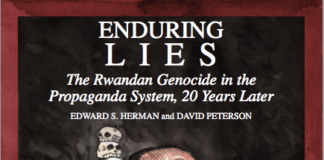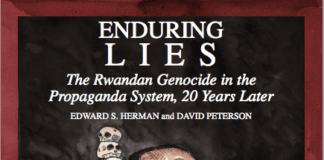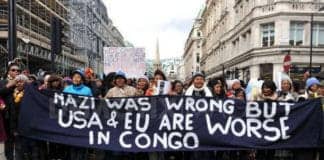Tags The Politics of Genocide
Tag: The Politics of Genocide
Et tu, RT? Amplifying Western disinformation on Rwanda
During a recent campaign event, Florida Sen. Bill Nelson said: “That story of Rwanda is very instructive to us because when a place gets so tribal that the two tribes won’t have anything to do with each other, and that jealousy turns into hate – we saw what happened to the Hutus and the Tutsis in Rwanda, it turned into a genocide. A million people hacked to death within a few months. And we have got to watch what’s happening here.”
Kagame’s new Order of Thieves Without Borders: Neocolonial kleptocrats with Clinton...
On Nov. 18, Rwandan President Paul Kagame inducted seven thieves without borders and one medical doctor into his “National Order of Outstanding Friendship,” presenting them with medals for “exemplary service” to the nation, meaning himself and his ruling party, the Rwandan Patriotic Front (RPF). Kagame is a modern day exemplar of French King Louis XIV’s theory of government: “L’état, c’est moi” (“I am the state”).
Killing the Congolese people, an interview with Sylvestre Mido
Genocost, a U.K.-based Congolese advocacy group, commemorated Congo Genocide this week on Aug. 2. Aug. 2 is the day that U.S. allies Rwanda and Uganda invaded the Democratic Republic of the Congo, starting the Second Congo War in 1998. Though a peace treaty was signed in 2003, the violence, displacement and mass killing continue. Genocost asks that nations formally recognize Aug. 2 as Congo Genocide Commemoration Day. I spoke to Genocost spokesperson Sylvester Mido.
Rwanda, the enduring lies: a Project Censored interview with Professor Ed...
Paul Kagame, the leader of Rwanda, has killed more than five times as many people as Idi Amin. He invaded Rwanda in 1990 and carried out a war of conquest there that ended sometime in 1994. He invaded the Democratic Republic of the Congo in 1996 and went in and out of that country for years, killing what the U.N. itself admitted was probably more than 4 million people. The U.S. not only failed to stop it, we actually supported the mass killing. Paul Kagame is a double genocidist, and one could argue too that Bill Clinton was a partner in this. Bill Clinton is arguably a genocidist.
Kibeho and Srebrenica: Ed Herman on the politics of genocide
This week marked the 20th anniversary of the 1995 Kibeho Massacre in Southwestern Rwanda, where an estimated 8,000 Rwandan Hutu people were killed by Rwandan President Paul Kagame’s Rwandan Patriotic Army. The same number of people were killed in Bosnia, also in 1995. Professor Ed Herman explains the politics of genocide manifest in media coverage of the 1995 massacres in Kibeho and Srebrenica.
Zionism, Rwanda and American universities
Rwandan President Paul Kagame will speak at the University of Hartford, Connecticut’s Maurice Greenberg Center for Judaic Studies to mark the launch of its “Genocide and Holocaust Education Initiative,” despite scholars, journalists and protestors all over the world, and nearly 20 years of U.N. reports accusing Kagame himself of genocide and mass atrocities in Rwanda and the Democratic Republic of the Congo.
Rwanda is no excuse for the U.S. to intervene in Sudan
Advocates of intervention in Southern Sudan argue that the U.S. can’t be bystanders to what could become another Rwanda and must become instead “upstanders” preventing genocide. Was the U.S. a bystander to the Rwanda Genocide? Professors Peter Erlinder and Edward Herman both say no.
Obama take heed: French judge files charges against Kagame allies
On Dec. 15, a French judge filed preliminary charges against six people close to Rwandan President Paul Kagame for the 1994 assassination of the Rwandan and Burundian presidents that triggered the Rwanda Genocide. When will Obama take heed of these new French charges? How much longer will the U.S. back the regime sued on two continents and in three countries?










